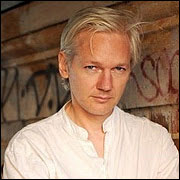
The status of WikiLeaks founder Julian Assange grew a bit murky on Tuesday after the group accused the U.S. State Department of pressuring Ecuadorian officials to block him from posting additional emails linked to presidential candidate Hillary Clinton.
The Ecuadorian foreign ministry on Tuesday acknowledged placing temporary restrictions on Assange’s access, saying in a statement that it did not wish to interfere in a foreign election. It also said that it was acting on its own and not in response to any outside pressures.
Assange has been holed up in the Ecuadorian embassy in London since 2012 to shield himself from two outstanding sex assault charges stemming from a 2010 trip he made to Sweden. He has continued to lead the WikiLeaks organization from there.
WikiLeaks earlier on Tuesday had accused U.S. Secretary of State John Kerry of pressuring his counterparts in Ecuador to crack down on the email leaks during a round of peace negotiations to end the decades-old conflict between Marxist FARC rebels and the Columbian military.
Kerry held private meetings with Ecuador during a sideline period in negotiations with Columbia that began on Sept. 26, WikiLeaks claimed.
The John Kerry private meeting with Ecuador was made on the sidelines of the negotiations which took place pricipally on Sep 26 in Colombia.
— WikiLeaks (@WikiLeaks) October 18, 2016
Assange lost his Internet connection at the Embassy at 5 p.m. on Saturday GMT, shortly after the group published Clinton’s Goldman Sachs speech, WikiLeaks said in an earlier tweet.
We can confirm Ecuador cut off Assange's internet access Saturday, 5pm GMT, shortly after publication of Clinton's Goldman Sachs speechs.
— WikiLeaks (@WikiLeaks) October 17, 2016
Code Blue
WikiLeaks initially claimed that a state party intentionally severed Assange’s Internet link and that it had “activated the appropriate contingency plans.”
WikiLeaks also released three tweets called “pre-commitment 1: John Kerry,” “pre-commitment 2: Ecuador” and “pre-commitment 3: UK FCO.” Each tweet included what appeared to be alpha-numeric cryptokeys, more than 60 characters long.
The tweets set off a frenzy of speculation, including rumors that Assange had died. However, that rumor was quickly shot down.
Assange had warned for several months that he would release information that was damaging to Clinton before the November presidential election.
Method and Madness
The method and motivation of the various actors in this most recent drama left Troy Hunt, a Microsoft regional director and MVP, at a loss as to exactly what happened this weekend.
“Seems a bit weird to me — Ecuador has granted him asylum,” he told the E-Commerce Times. “Why pull his Internet? And how was the U.S. able to do it when he’s holed up in a building in London? Or was it political pressure rather than technical means used by the U.S.?”
Kerry had nothing to do with Assange’s loss of Internet access, according to State Department spokesperson John Kirby.
“While our concerns about WikiLeaks are longstanding, any suggestion that Secretary Kerry or the State Department were involved in shutting down WikiLeaks is false,” he said. “Reports that Secretary Kerry had conversations with Ecuadorian officials about this are simply untrue. Period.”
US Will Strike Back
Assange made headlines earlier this year when WikiLeaks was connected to suspected Russian hacks of emails belonging to Hillary Clinton and her associates, as well as network intrusions of several Democratic Party organizations.
The leaked emails are part of the Russian government’s targeted campaign to undermine the confidence in the U.S. presidential election and possibly influence the outcome, according to U.S. government officials and cybersecurity experts.
The Obama administration earlier this month officially accused the Russian government of orchestrating the cyberattacks and promised to deliver a proportional response.
Officials at Ecuador’s U.S. embassy referred us to the country’s Foreign Ministry, which did not respond to our request to comment on this story.
WikiLeaks recently released a new batch of emails belonging to longtime Clinton associate John Podesta, who is the current chairman of the Clinton presidential campaign and was chief of staff under President Bill Clinton and counselor to President Barack Obama.





















































I think WikiLeaks does a service to the people. We don’t punish our own news organizations if they obtain information through hacks, and informants. It brings a sense of reality into what these people really think and do. Snowden has done a similar service providing information he felt the public should know. It’s interesting how our government wants to stop a Assange or a Snowden but not a Hillary Clinton? So Snowden committed treason but Clinton didn’t? When I think logically of either Trump or Clinton I realize neither is prepared to deal with the problems of the US or the world. They both provide little substance that has any chance of really being anymore than empty promises. Clinton who has lot’s of experience but can’t even secure our most important government communications is incompetent. Trump is so lacking in experience and temperament he cannot possible deal properly with anyone without his ego getting in his way. How we whittled down to these two is really scary for what American’s pick as the top two choices.